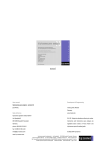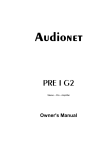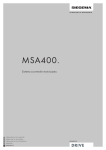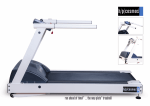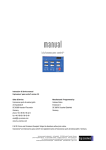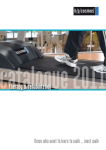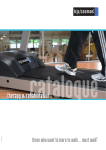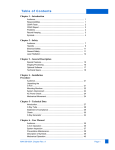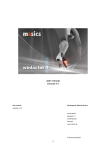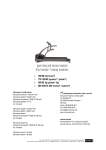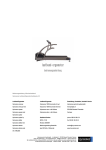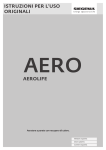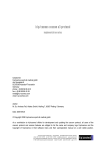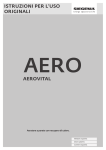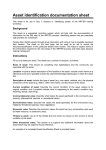Download operating instruction and service manual sprint trainer model names
Transcript
® & operating instruction and service manual sprint trainer model names: development, production, sales & service h/p/cosmos comet® version: 3.0 h/p/cosmos sports & medical gmbh h/p/cosmos comet 3p date: 18.01.2013 Am Sportplatz 8 ® DE 83365 Nussdorf-Traunstein E & OE. Errors and omissions excepted. Germany Subject to alterations without prior notice. phone +49 86 69 86 42 0 fax +49 86 69 86 42 49 [email protected] www.h-p-cosmos.com h/p/cosmos sports & medical gmbh Am Sportplatz 8 DE 83365 Nussdorf-Traunstein / Germany phone +49 (0) 86 69 / 86 42-0 fax +49 (0) 86 69 / 86 42-49 [email protected] www.h-p-cosmos.com file: n:\article\cos13376-en\20130121_cos13376-en_manual_h-p-cosmos_comet_sprint-trainer.doc © 2013 h/p/cosmos sports & medical gmbh created 21.01.2013 printed 21.01.2013 page: 1 of 39 LN h/p/cosmos comet® This manual is only valid for the firmware-/software version noted on the first page of this manual and only for the original configuration of the first delivery of the machine. Firmware updates, software updates, changes of the system configuration or retrofittings of additional equipment or accessories can result in invalidity of this manual. In case of alterations of the device or the additional equipment; the latest version of the manual or the corresponding additional information always should be considered. The latest manual version is always available in PDF version on the h/p/cosmos website: http://www.h-p-cosmos.com/en/company/downloads.htm N N It is strictly forbidden to perform any amendments of the technical design, technical specifications, labelling and configurations (except allowed programming as described in this manual) of this machine and the software and accessories connected to this machine. Any amendments or unauthorized service will result in loss of manufacturer’s liability and warranty. file: n:\article\cos13376-en\20130121_cos13376-en_manual_h-p-cosmos_comet_sprint-trainer.doc © 2013 h/p/cosmos sports & medical gmbh [email protected] created 21.01.2013 printed 21.01.2013 page: 2 of 39 LN Introduction [1.] Dear customer, We would like to express our gratitude for putting your trust in us, in deciding for this high-quality sprint trainer. Since 1988 h/p/cosmos has been developing and manufacturing running machines (treadmill ergometers), systems and accessories for applications in sports, rehabilitation, medicine, diagnostics and science. Since 1992 / 1994 h/p/cosmos has also been developing and manufacturing sprint trainers and ladder ergometer for sports and athletic application. Because the sprint trainer is a motor-driven device, you must pay special attention to the mentioned safety regulations. If proper notice is taken of the safety regulations the operation of our devices is almost without any risk. The neglect of the safety regulations could result in dangerous situations. Therefore please read the installation and operation manual and the danger precautions in full before taking the device into operation. Some simple maintenance and monitoring (no repair work!), as described, can easily be done or even have to be done by yourself. All kinds of installation and repair work and most maintenance work are to be performed only by trained and authorized technicians who have been certified by h/p/cosmos. The following symbols will indicate which work can be done by the customer and which work has to be done only by authorized technicians: The customer/user should perform this maintenance and monitoring work. Some safety checks or monitoring (for examples harnesses and ropes, running belt condition and position, etc.) have to be performed on daily basis. It is not expedient to contract certified technicians for such maintenance work. However, where it is practical, all maintenance and monitoring work marked with this symbol can also be performed by certified technicians. All installation, maintenance, repair and monitoring work marked with this symbol must only be performed by trained and authorized technicians who have been certified by h/p/cosmos. Customers/users must not perform these kinds of tasks and work. We recommend calling our competent service team or entering into a maintenance contract for a routine service at an interval of 6 or 12 months for standard machines and standard applications. A form for registration of your institution and device is included in the delivery. In order to be able to supply you with the latest technical information and service, it is important for you to fill out the form. Therefore please fill out the form for registration immediately and send it back via fax, email or mail. This operating and service manual as a firm part of the delivery has to be accessible to the user at any time. It has been written with great care. Should you, however, still find any details which do not correspond with your device, please notify us so that we can correct any mistakes as soon as possible. Subject to alterations without prior notice. Errors and omissions excepted. E & OE. We wish you a lot of fun and success while exercise and working with your sprint trainer h/p/cosmos comet. h Franz Harrer President h/p/cosmos sports & medical gmbh file: n:\article\cos13376-en\20130121_cos13376-en_manual_h-p-cosmos_comet_sprint-trainer.doc © 2013 h/p/cosmos sports & medical gmbh [email protected] created 21.01.2013 printed 21.01.2013 page: 3 of 39 LN Content [2.] [1.] Introduction ........................................................................................................................................................................ 3 [2.] Content ............................................................................................................................................................................... 4 [3.] Safety .................................................................................................................................................................................. 7 [3.A] Safety notice, wearnings, danger precautions ................................................................................................................. 7 [3.B] General instructions / Safety ............................................................................................................................................ 8 [3.C] Instructions for safety and operation ................................................................................................................................ 8 [3.C1] Electric safety / Safety classes ............................................................................................................................ 8 [3.C2] Environmental Requirements............................................................................................................................... 9 [3.D] Symbols used ................................................................................................................................................................. 10 [3.E] Safety standards ............................................................................................................................................................ 11 [3.E1] VDE norm .......................................................................................................................................................... 11 [3.E2] The c mark ..................................................................................................................................................... 11 [4th] Intended use / indications, contraindications, risks & forbidden use ...................................................................... 11 [4thA] Intended use / indications ............................................................................................................................................... 11 [4.B] Forbidden Use ................................................................................................................................................................ 12 [5.] Starting up ........................................................................................................................................................................ 13 [5.A] Transport, unpacking and packaging ............................................................................................................................. 13 [5.B] Mechanical installation ................................................................................................................................................... 13 [5.C] Electrical Installation ....................................................................................................................................................... 14 [5thC1] Electric safety measurements and “First Measured Values“ ............................................................................. 15 [5.D] Operation........................................................................................................................................................................ 16 [5.D1] Switching the device on / Power ON.................................................................................................................. 16 [5.D2] Switching the device off / Power OFF ................................................................................................................ 17 [5.E] Emergency-Stop ............................................................................................................................................................. 17 [6.] Operation .......................................................................................................................................................................... 18 [6.A] Keys and displays .......................................................................................................................................................... 18 [6.B] Fields of application ........................................................................................................................................................ 19 [6.B1] Traction resitance training.................................................................................................................................. 19 [6.B2] Traction support training .................................................................................................................................... 20 [6.B3] Potentiometer scales ......................................................................................................................................... 22 [6.C] Instruction protocol, signatures ...................................................................................................................................... 23 [7.] Maintenance ..................................................................................................................................................................... 24 [7.A] Preventive maintenance ...................................................................................................................................... 24 file: n:\article\cos13376-en\20130121_cos13376-en_manual_h-p-cosmos_comet_sprint-trainer.doc © 2013 h/p/cosmos sports & medical gmbh [email protected] created 21.01.2013 printed 21.01.2013 page: 4 of 39 LN [7.B] Immediate maintenance ....................................................................................................................................... 24 [7.C] Prescribed returned controls [7.C1] Visual check ................................................................................................................................ 25 ............................................................................................................................................ 25 [7thC2] Protective earth resistance (RPE) measurement [7thC3] Isolation resistance (RISO) measurement ..................................................................................... 25 ............................................................................................... 25 [7thC4] Equivalent (alternative) leakage current (IEDL) measurement [7thC5] Leakage current measurement ................................................................. 26 .............................................................................................................. 26 [7thC6] Electric safety tester and measurements ............................................................................................... 27 [7thC7] Building installation: Electric checks, protective earth function, RCD, leakage current .......................... 27 [7.D] Regular maintenance ..................................................................................................................................................... 28 [7.D1] Greasing the thread of the rope alignment (guide bar) [7.D2] Cleaning the interior [7.D3] Replacemet of the rope ........................................................................... 28 ................................................................................................................................ 28 ........................................................................................................................... 29 [8.] Trouble shooting.............................................................................................................................................................. 30 [8.A] Mechanical / noise problems .......................................................................................................................................... 30 [8.B] Fuses .............................................................................................................................................................................. 30 [8.C] Interference factor .......................................................................................................................................................... 30 [8.C1] Electrostatic discharge ....................................................................................................................................... 30 [8.C2] Source of interference........................................................................................................................................ 30 [8.D] Interface compatibility ..................................................................................................................................................... 30 [8.D1] accessories ........................................................................................................................................................ 31 [8.E] Service report – [cos15531] ........................................................................................................................................... 32 [8.F] Control protocol – [cos11690en-02] ............................................................................................................................... 33 [9.] Technical data .................................................................................................................................................................. 34 [9thA] Electromagnetic compatibility (EMC) and immunity: Guidance and manufacturer's declaration ................................... 35 [10.] Certificates ..................................................................................................................................................................... 36 [10thA] [10thB] Certificate of compliance / EC declaration of conformity ................................................................................... 36 Certificate of the TSA (TÜV) according to ISO 9001 ......................................................................................... 37 [11.] Disposal .......................................................................................................................................................................... 38 file: n:\article\cos13376-en\20130121_cos13376-en_manual_h-p-cosmos_comet_sprint-trainer.doc © 2013 h/p/cosmos sports & medical gmbh [email protected] created 21.01.2013 printed 21.01.2013 page: 5 of 39 LN [11.A] Disassemble and cut up ................................................................................................................................................. 38 [11.B] h/p/cosmos sprint trainer ................................................................................................................................................ 38 [11.C] h/p/cosmos service oil .................................................................................................................................................... 38 [12.] Contact............................................................................................................................................................................ 39 file: n:\article\cos13376-en\20130121_cos13376-en_manual_h-p-cosmos_comet_sprint-trainer.doc © 2013 h/p/cosmos sports & medical gmbh [email protected] created 21.01.2013 printed 21.01.2013 page: 6 of 39 LN Safety [3.] [3.A] Safety notice, wearnings, danger precautions N N N N N N N N N N N N N N N N N N N N The sprint trainer is used at one’s own risk. Use the sprint trainer only under supervision of your trainer. It is not allowed to use the sprint trainer without a supervisor. Do not use the machine without a detailed instruction prior to the usage. Do not touch any moving parts of the machine at any time. Never disconnect the rope from the athlete during exercise. Do not use the machine if you think there is a technical defect of the machine or the power supply. Dangerous capture area at rope re-entry zone and at any other moving part of the machine. Make sure, that subjects and users with long hair, wide clothes, jewellery, etc. do not get caught in capture area or at any moving part of the machine. Children and animals are not allowed to use the sprint trainer and should not get near to it. Interrupt the training immediately if you start feeling sick or dizzy and see your doctor. Subjects with a cardiac pacemaker or who suffers from any kind of physical restriction must not use the sprint trainer. Start with low force for warming up and do not use high loads immediately. While traction support, start reducing the traction support load at least 40 meters before the subject approaches the sprint trainer. The subject has to reduce speed in time, otherwise the subject may crash against the sprint trainer. Explicit warning of improper use. Ensure that the power connection cable is installed proper and safely and that nobody can stumble or fall over the cable. Pay attention to further safety regulations and operation instructions in the appendix of this instruction manual. Do not drink and eat any lubrication material and no other material or parts of this device, and keep all lubrication material and all other parts away from children and animals. The delivered compensation rope has to be used for running support only. Do not use it for counter move training. The compensation rope is dedicated for a maximum load of 10 kg. These safety regulations are to be displayed within sight of the sprint trainer. The safety regulations and dangers have to be pointed out to every user. The manufacturer does not undertake any liability for any injury to persons or damage to property. Important notes, warnings and precautions are marked with this sign. It also reminds you of concerns which have to be considered for measurements and connection with other devices. Disregard of intended use, safety notes, warnings and precautions, unauthorized or lack of maintenance and / or regular safety checks may lead to injuries or even death and / or can damage the device and will result in loss of any liability and warranty. file: n:\article\cos13376-en\20130121_cos13376-en_manual_h-p-cosmos_comet_sprint-trainer.doc © 2013 h/p/cosmos sports & medical gmbh [email protected] created 21.01.2013 printed 21.01.2013 page: 7 of 39 LN [3.B] General instructions / Safety This instruction manual is part of the device and has always to be accessible. Exact observance of the instruction manual is a requirement for the appropriate operation of an h/p/cosmos device. This sign reminds you of paying attention to the enclosed information and to the manual. It also reminds you of concerns which have to be considered for measurements and connection with other devices. The safety of your subjects and the compliance to the mentioned accuracy of measurement can only be guaranteed, if the consumption goods, sensors and detectors, described in the instruction manual, are being used. Absorption-, cleansing- and disinfecting chemicals are only to be kept in the appropriate reservoirs. At the connection of gas pressure container it has to be examined about its MOT-admissibility (TÜV) first. Pull the plug before cleansing or disinfecting electric devices. We guarantee for the safety, reliability and function of its devices only if ... N installation, extension, alteration and repair is performed by authorized people N the room for installation corresponds to the DIN and VDE installation directives. N the device is plugged in at a socket with a protection system. N the room for installation corresponds to the requirements of the surroundings for the device. N the device after the instruction is being used in accordance with the instruction manual. The entry of fluid into the device has to be removed immediately by the authorized customer service and a safety examination has to be performed. Damaged socket connections, wires and pressure control switches have to be replaced instantly by trained personnel or by authorized persons. [3.C] Instructions for safety and operation The following directives correspond to the in the Federal Republic of Germany acknowledged safety model. Please consider that there may be national discrepancies for other countries. [3.C1] Electric safety / Safety classes In order to protect the athlete and the training personnel the association of German electro-technicians Inc, (VDE) has published special directives for medical used rooms and electro-medical devices. Devices with a power supply therefore have to, in order to prevent the passing on of the mains voltage over to touchable metal pieces, be equipped with not only a reliable isolation of the parts being under voltage but also additional safety precautions. The VDE-association divides it into so called safety classes. Of the, for electro-medical devices, licensed safety classes are mainly used the safety class I (i.e. safety precautions with protective wiring), and the safety class II, (i.e. safety measures without protective wiring but with double isolation): Devices of the safety class I are devices, where the metallic casing-parts are connected with the protective wire of the line net via the safety contact. In the case of an isolation error the inserted fuse element switches off. file: n:\article\cos13376-en\20130121_cos13376-en_manual_h-p-cosmos_comet_sprint-trainer.doc © 2013 h/p/cosmos sports & medical gmbh [email protected] created 21.01.2013 printed 21.01.2013 page: 8 of 39 LN [3.C2] Environmental Requirements Sprint trainers are not to be used in medically utilized rooms with a danger of explosions or in easily inflammable atmospheres. The devices should not be installed near to e.g. an x-ray device, motors or transformer with high connection power, as the electric and magnetic interference can falsify measurements or even make them impossible. High voltage lines should be avoided. If not stated otherwise in the delivery information the devices are designed for operation in normal climatic surroundings (DIN IEC 60601-1): Temperature + 10° … + 40° C Relative humidity 30 … 75 % (non condensing) Air pressure 700 … 1060 mbar The sprint trainer has to be protected from high humidity. Venting slots are not to be covered; otherwise it would hinder the air circulation. Store the devices at a temperature of – 20° ... + 50° C. file: n:\article\cos13376-en\20130121_cos13376-en_manual_h-p-cosmos_comet_sprint-trainer.doc © 2013 h/p/cosmos sports & medical gmbh [email protected] created 21.01.2013 printed 21.01.2013 page: 9 of 39 LN [3.D] Symbols used All symbols used comply with the respective norms IEC417, IEC878, EN957-1 and Council Directive 2002/96/EC. c J N T 3NT EC Declaration of Conformity for sports and fitness sprint trainers M Protection ground IEC 60417-5019 Read manufacturer’s guide, advice, instructions and manual ISO 7000-1641 N Earth IEC 60417-5017 Symbol based on ISO7010:2003-M002. Follow manufacturer’s guide, advice, instructions in the manual. Manual contains relevant safety information. Non-sterile product Warning / safety precautions Pay attention to accompanying instructions / ISO 7010-W001 Chassis ground Dangerous electric voltage IEC 60417-5036 Risk/danger of entanglement connection point for Neutral line IEC 60445 Symbol for collection, treatment, recycling and disposal of waste electrical and electronic equipment (WEEE) as set out in directive 2002/96/EC of 27 January 2003 of the European Parliament and of the Council on waste electrical and electronic equipment. Necessary to reduce the waste management problems linked to heavy metals and flame retardants. Alternating current (AC) IEC 60417-5032 Warning of hot surfaces Alternating 3-phase current (AC) with neutral line IEC 60417-5032-2 Manufacturer and year of manufacture 2013 file: n:\article\cos13376-en\20130121_cos13376-en_manual_h-p-cosmos_comet_sprint-trainer.doc © 2013 h/p/cosmos sports & medical gmbh [email protected] created 21.01.2013 printed 21.01.2013 page: 10 of 39 LN [3.E] Safety standards The sprint trainer must not be used, if the certificates/permissions and the (according to the list of technical specifications) defined safety standards do not correspond with the local and country-specific requirements. The country-specific requirements must be compared before initial operation. Operate sprint trainer only, if the requirements correspond. [3.E1] VDE norm The sprint trainers, designed for professional use, are produced according to strict safety- and quality controls. The sprint trainers for the professional application in sports and fitness have been built corresponding to the DIN EN 60335-1 (VDE 0700) guidelines. [3.E2] The c mark The c mark on the nameplate of the sports and fitness sprint trainers confirms the compliance to the ECdirective 89/336/EEC appendix I (EMC electromagnetic compatibility). The audit has been conducted after the criterion of jamming and interference immunity. EMC certification body: EMV Testhaus GmbH, Gustav - Hertz - Strasse 35, 94315 Straubing / Germany [4th] Intended use / indications, contraindications, risks & forbidden use The intended application, discussed in the following, can be performed with any h/p/cosmos comet sprint trainer model, although there are more or less recommended solutions. Consider obligatory safety accessories (for example marking cones for safety zones, etc.) as described in the respective chapters. [4thA] Intended N N N use / indications Endurance training walking and running Sprint training running with traction support Sprint training running with traction resistance Children aged 14 years or older are only allowed to use the sprint trainer machine under constant supervision of a experienced sports trainer who is very familiar with this sprint trainer device. file: n:\article\cos13376-en\20130121_cos13376-en_manual_h-p-cosmos_comet_sprint-trainer.doc © 2013 h/p/cosmos sports & medical gmbh [email protected] created 21.01.2013 printed 21.01.2013 page: 11 of 39 LN [4.B] Forbidden Use N N N N N N N N N N N N N The sprint trainer is a pure sports device and must not be used for any medical or rehabilitation application. The sprint trainer must not be used in any room or condition with high humidity. h/p/cosmos devices must not be used in environmental conditions other than those specified in the chapter „Technical specifications“ and “Environmental conditions” (e.g. in wet and humid areas, swimming pools, sauna, environmental chambers, high-pressure-, low-pressure, altitude- and oxygen-chambers, etc.). Do not modify the device and do not connect them to other equipment which is not explicitly declared as compatible by all involved manufactures. The sprint trainer must not be used without being carefully instructed by specialist staff and without having received notes on the safety regulations. Children under 14 years must not use the sprint trainer. Children aged 14 or older must only use teh device if an authorized trainer keeps them under constant supervision. If the test subject complains about nausea or dizziness, the training is to be terminated immediately and a physician is to be consulted. Subjects with cardiac pacemakers and test subjects with weakened health must not use the device. The sprint trainer must not be used for animals. Improper use, i. e. the sprint trainer is used for an other purpose than mentioned under "Fields of Application" / „Intended Use“. In the event of any detected and/or assumed malfunctions and/or defects or unreadable safety warning labels, the device has to be taken out of operation, clearly marked as such and disabled. The supplier and authorized service personnel have to be informed in writing. Under no circumstances should a subject or other user be overloaded or overstressed. file: n:\article\cos13376-en\20130121_cos13376-en_manual_h-p-cosmos_comet_sprint-trainer.doc © 2013 h/p/cosmos sports & medical gmbh [email protected] created 21.01.2013 printed 21.01.2013 page: 12 of 39 LN Starting up [5.] [5.A] Transport, unpacking and packaging When receiving the machine in a crate or unpacked, make sure the machine and/or the packaging is not damaged. If you discover any damage make a note on the packing-list / delivery note of the carrier. The manufacturer does not undertake any liability for any damage which is not reported immediately on the packing-list / delivery note. Before you unpack the machine read instructions on the crate. Make sure that the machine, power connection cable or any optional equipment will not be damaged during unpacking. In order to avoid any damages most of all machines are being transported and installed by the manufacturer or an authorized carrier. If delivered by the manufacturer the packaging will be taken back and recycled. If the machine is being delivered by a carrier, you can recycle the packaging yourself or send it back to the manufacturer (transportation is to be paid by the customer). Often a recyclable transport tool or packaging is included in the extent of delivery. Ask your dealer and the carrier to take the packaging and the recyclable transport tool back to your dealer or to h/p/cosmos at your own costs. In some cases a credit note can be granted. [5.B] Mechanical installation N N N N N N Warning! Installation, commissioning, instruction and maintenance only to be conducted by h/p/cosmos trained and authorised personnel. For safety purpose a marking of the slow down zone 40 m and stop zone 5 m before the machine is obligatory. In order to ensure proper installation and safety, either the manufacturer or an authorized service crew should always perform transport and installation of the devices. For reasons of safety please make sure that there is a safety zone of 5 m in front and 2.5 m around the machine. The provided space for the machine should be even and horizontal. If the machine is installed safely and horizontal, it can be plugged in (see installation instructions) and taken into operation. file: n:\article\cos13376-en\20130121_cos13376-en_manual_h-p-cosmos_comet_sprint-trainer.doc © 2013 h/p/cosmos sports & medical gmbh [email protected] created 21.01.2013 printed 21.01.2013 page: 13 of 39 LN [5.C] Electrical Installation An overload or voltage drop (even temporary) of more than 20 % of the mains voltage might cause a malfunction and/or defect and might totally switch off the sprint trainer. In the event of such high voltage drops or total power failure, the sprint trainer switches off and the running belt stops. To start again, switch on the sprint trainer at the main ”ON“ switch and press START at the keyboard. N N N h/p/cosmos sprint trainers are to be installed at a voltage power connection with ground wire (earthing,) including leakage-current protection switch (interrupter) and according to VDE 0100 or/and the currently valid regulations and directives. Requirements for special locations, areas and establishments (e.g. medically used areas) must be strictly adhered to. PE connection (protection-earth contact) is stipulated for all sprint trainers. The voltage drop between the beginning of the consumer’s installation and the wall socket must not be more than 4 % (DIN VDE 0100-520). It is the consignee’s and user’s personal responsibility to check the correct function of the mains connection including the outlets. An authorized electrical engineer must check these points for perfect functioning regularly (1 ... 4 years). Inspections of the electrical installations within the building are not incumbent on the supplier h/p/cosmos. Read the nameplate of the machine before connecting the machine to the power outlet in order to determine whether the machine was designed for special voltage supply (e.g. 110 V and 25 A). The standard power supply of 230 V / AC, 50/60 Hz is sufficient for most of the sprint trainers. The bigger sprint trainers with higher motor capacity require a 3 phase AC power supply: 3 x 400 V / 16 A fuse and clockwise rotation. right: CEE power outlet (socket), 5-pin, 16 A [cos11092] left: CEE power outlet (socket), 5-pin, 32 A [cos11090] Power supply for h/p/cosmos comet 230 Volt AC 1~/N/PE f: 50/60 Hz Imax: 16.0 A single phase current. 16 A fuse (C characteristic) Power supply for h/p/cosmos comet 3p 400 Volt AC 3~/N/PE f: 50/60 Hz Imax: 16.0 A 3 phase current with clockwise rotation field. 16 A fuse (C characteristic) The mentioned wire colours are applicable for Germany; different colours may be applicable for other countries. Voltage values for 3-phase voltage power supply: from L1 to L2: 400 V, from L1 to L3: 400 V, from L2 to L3: 400 V from L1 to N: 230 V, from L2 to N: 230 V, from L3 to N: 230 V file: n:\article\cos13376-en\20130121_cos13376-en_manual_h-p-cosmos_comet_sprint-trainer.doc © 2013 h/p/cosmos sports & medical gmbh [email protected] created 21.01.2013 printed 21.01.2013 page: 14 of 39 LN N N N N N Use a usual 16 Ampere expulsion fuse with “C” tripping circuit for your house distribution. If, however, the expulsion fuses switch off when starting the device, the circuit has to be secured with a blowout fuse or an expulsion fuse with another tripping circuit (e.g.: K–fuse). Read name plate and technical data of the machine just to make sure. Please ask your electrical engineer or h/p/cosmos if you have further questions. Before installing the sprint trainer, please compare the specifications on the name plate concerning the mains voltage and the mains frequency with your local characteristics. Connect only if identical. Check the main lead, the voltage power supply outlet and ground wire protection contacts before plugging in. Damaged leads and couplers and defective or dirty contacts have to be exchanged immediately. Rubber leads can become porous and friable after some years. N N N Plug the sprint trainers directly into the wall socket. Each sprint trainer should be connected to a separate circuit. Mark the socket with the name and serial number of the sprint trainer. The use of extension cables or multiple plug sockets is not allowed. Electrical devices with mains connections must neither be used in wet and humid areas (e.g. swimming pools, saunas, etc.) nor in environmental chambers. name plate of a single phase powered device example: h/p/cosmos comet® name plate of a 3-phase powered device example: h/p/cosmos comet 3p® For details please refer to chapter [9.] “Technical data” on page 34. [5thC1] Electric safety measurements and “First Measured Values“ Immediately upon first installation at the customer’s site an electric safety test and measurement has to be performed for “Protective Earth Resistance“, “Isolation Resistance“ and “Leakage Current“. The values are to be recorded in a special protocol [cos11690xx] and marked as “first measured values“. Further details are described in chapter “Maintenance / safety inspections”. One copy of this protocol [cos11690xx] remains with the owner’s manual while the original of the protocol with the “first measured values“ should be sent to the manufacturer h/p/cosmos. Picture: Example for electric safety testing device based on IEC 60601-1 file: n:\article\cos13376-en\20130121_cos13376-en_manual_h-p-cosmos_comet_sprint-trainer.doc © 2013 h/p/cosmos sports & medical gmbh [email protected] created 21.01.2013 printed 21.01.2013 page: 15 of 39 LN [5.D] Operation [5.D1] Switching the device on / Power ON N N N N N N N N N [4.D1] Pull out the stabilization pillar and adjust the leveling socket. The machine must have a firm stand. If the pillar is not pulled, the machine can not be switched ON. Do not switch the device on or off within less than 1 min. Otherwise it could lead to interference in the adjustment of the motor or to the failure of the backup. Too short switch on / switch off intervals will lead to a deactivation of the electronic components and results in an overload of the circuit fuse. For the professional use, where the devices are often being used daily, we recommend to switch on the devices in the morning, and leave it in the stand-by mode during the day. To power on the machine, the expulsion fuse of the machine has to be switched on: „I“ In order to be able to switch on the device, you may have to unlock the Emergency-stop switch first by turning it around (to the left hand side or right hand side, see symbol). Turn the red Main Switch to the position ON. Power on the machine by using the white "ON"-key at the lower right hand side of the sprint trainer. The indicator light within the key is glowing. (If the indicator does not flash up, please check the power supply, the expulsion fuse, the Emergency-stop and the stabilization pillar.) Step no. Description [01] Power socket [02] Function Power supply for the machine Power supply for the machine Can be locked at position OFF with an extra cylinder locker Main switch [03] white: Power ON the machine black: Power OFF the machine Power ON / OFF button [04] Power lamp Control lamp for power ON file: n:\article\cos13376-en\20130121_cos13376-en_manual_h-p-cosmos_comet_sprint-trainer.doc © 2013 h/p/cosmos sports & medical gmbh [email protected] created 21.01.2013 printed 21.01.2013 page: 16 of 39 LN [5.D2] Switching the device off / Power OFF N N [5.E] Switch off the machine by pressing the black „O“-key at the lower side of the machine. The indicator within the key is extinguished. Turn the red Main Switch to the position “O” OFF Emergency-Stop When in danger of falling or in any emergency case please press the red button of the Emergency-stop at the UserTerminal. In order to switch on the device again, unlock the Emergency-stop by turning it (to the left hand side/ right hand side see symbols). The machine then has to be switched on with the white „I“-key again. Before switching it on again, however, wait for at least 1 minute. As mentioned above „Switching the device off“. N N Use the Emergency-stop only if in danger. The Emergency-stop is not to be used as a normal stop-key. Only in case of emergency, the load can be reduced to 0 or the emergency-stop-button can be pressed - otherwise the rope will be rolled up uncontrolled and jammed. file: n:\article\cos13376-en\20130121_cos13376-en_manual_h-p-cosmos_comet_sprint-trainer.doc © 2013 h/p/cosmos sports & medical gmbh [email protected] created 21.01.2013 printed 21.01.2013 page: 17 of 39 LN Operation [6.] [6.A] Keys and displays Do not lean on the operating panel. Do not put any pressure on the display. Press the keys softly. [5.] No. [01] Description Function Emergency stop Powers off the machine. Shall be pressed in emergency case only. Need to be released before switching on the device. [02] Motor control OFF Powers off the motor control unit (the servo drive). Important: Reduce the load slowly before power off the motor control. [03] Motor control ON Powers on the motor control unit (the servo drive). Important: Before power on the motor control unit, the two potentiometers (load and speed) have to be on position 0 (zero). [04] Speed control The speed control potentiometer shall be turned to 0 before switching on the motor control. The speed control potentiometer shall be turned to maximum during normal operation. The scale at the potentiometer indicates the possible speed from 0 to maximum speed. [05] Stabilizer pillar The control lamp will be on and the machine can not be operated if the stabilizer pillar at the front of the machine is not fully pulled. This is a safety measurement. [06] Error & reset The error lamp will be on in case of any error detected by the self diagnosis system or in case of any overload or safety power off. To reset the error press this button. Some errors can only be reset by fully powering OFF the device at the main switch. [07] Load control The load control potentiometer shall be turned to 0 before switching on the motor control. The load control potentiometer shall be turned slowly to the desired load during normal operation. The scale at the potentiometer indicates the possible load from 0 to maximum speed. [08] Display The display of the motor control unit indicates the current load in percentage of max. possible load. The display indicates approx. the load in Newton force. The display also indicates error messages in case of malfunction or in case of overload. file: n:\article\cos13376-en\20130121_cos13376-en_manual_h-p-cosmos_comet_sprint-trainer.doc © 2013 h/p/cosmos sports & medical gmbh [email protected] created 21.01.2013 printed 21.01.2013 page: 18 of 39 LN [6.B] Fields of application The sprint trainer, designed for sports and fitness has not been tested for application in medical areas and therefore are not qualified for that field of application. The sprint trainer h/p/cosmos comet can simulate a traction force which is independent from the speed. A sophisticated and electronically controlled drive motor powers a winch drum with approx. 180 meters of a thin line. The athlete on the 100 meter track wears a belt around his waist and is connected to the sprint trainer via the thin line. The sprint trainer can be used for ... N Muscle power training for the athlete by using the traction resistance mode of the sprint trainer N Muscle speed training for the athlete by using the traction support mode of the sprint trainer [6.B1] Traction resitance training Dangerous capture area at rope re-entry zone and at the shaft drive system. Never open the device or the lid during operation and never touch any moving parts of the machine at any time. Always roll up the rope with tension. Use emergency-stop only if in danger or in danger of falling. N N N N N N N N N N Pull out the stabilization pillar and adjust the leveling socket. The machine must have a firm stand. If the pillar is not pulled, the machine can not be switched ON. Connect the subject with the line and the waist belt. Make sure that the line is not loose. The line must be slightly tensioned before powering on the machine. Power ON the machine on the main power on button. Turn load and speed potentiometer to 0 % and engage. Switch on the drive system. For normal operation the speed is set to max. level. Set the desired load slowly with the load control potentiometer Subject starts and performs traction resistance training by running away from the device. Do not unroll full length (max. 95 %) of the rope. After training the rope has to be rolled up under load (ca. 6 %). The drive system shall be powered ON only during operation. Switch off the drive system during stand-by and power off the device at the mains switch after use. file: n:\article\cos13376-en\20130121_cos13376-en_manual_h-p-cosmos_comet_sprint-trainer.doc © 2013 h/p/cosmos sports & medical gmbh [email protected] created 21.01.2013 printed 21.01.2013 page: 19 of 39 LN [6.B2] Traction support training N N N N N N N N N N N N N N Pull out the stabilization pillar and adjust the leveling socket. The machine must have a firm stand. If the pillar is not pulled, the machine can not be switched ON. Connect the subject with the line and the waist belt. Make sure that the line is not loose. The line must be slightly tensioned before powering on the machine. Power ON the machine on the main power on button. Turn load and speed potentiometer to 0 %-position and engange. Switch on the drive system. For normal operation the speed is set to max. level. Turn the load potentiometer slowly to ca. 6%. The subject moves slowly away from the device and hence unrolls the rope from the shaft. Set a marker at the beginning of the STOP-PHASE 40 m from the device. At the desired running distance (e.g. 100 m plus 40 m for the stop-phase = 140 m) the subject stops and turns 180° hence facing the device. Set the desired load slowly with the load control potentiometer. At loads below approx. 5...8 % during traction support training, the rope may not be rolled up fast enough due to the low traction load. Make sure the subject will not step on the rope. A rubber band adapter (article number [cos12736-02]) with a length of approx. 4.7 meters, which is linked between subject and main rope when using the device with low traction load of 3...8 %, may speed up the roll up during low traction load. Do not set too high traction support load for the subject, because too high traction support may result in serious injuries of the subject. Subject starts and performs traction support training by running towards the device Start reducing the traction support load at least 40 m before the subject approaches the sprint trainer device, otherwise the subject may crash against the device. For deceleration (40 m before the device) the traction support load must reduced to approx. 6 % by a second person. Only in case of emergency, the load can be reduced to 0 or the emergency-stop-button can be pressed otherwise the rope will be rolled up uncontrolled and jammed. The drive system shall be powered ON only during operation. Switch off the drive system during stand-by and power off the device at the mains switch after use. file: n:\article\cos13376-en\20130121_cos13376-en_manual_h-p-cosmos_comet_sprint-trainer.doc © 2013 h/p/cosmos sports & medical gmbh [email protected] created 21.01.2013 printed 21.01.2013 page: 20 of 39 LN N operation at low traction support, use of rubber adapter / expander When using low traction resistance of approx. 3 … 8 % of the device’s full capacity, the adjusted low power of the motor may not be able to speed up (accelerate) the rope drum in time. This may result in a loose traction rope during the first meters when the sprinter is accelerating from speed 0 to his maximum speed. A rubber band adapter (article number [cos12736-02]) with a length of approx. 4.7 meters can partly compensate this characteristics during the first acceleration. 1) Instead of connecting the main traction rope (1.5 mm diameter, approx. 180 m) directly to the waist belt on the subject, connect the 4.7 meter long rubber band (elastic rope adapter) between the the waist belt on the subject and the main long rope. See drawing below: red coloured expander, elastic rope. 2) First, the elastic rope expander is expanding (becoming longer), because the speed of the subject is 0 (while waiting for the start command) and the main rope is already pulling with a force of 3 … 8 % of the device’s full capacity. Important! Please never use more than 10 kg force when using the elastic expander since this expander has very much limited capacity and may be damaged at higher force! 3) Then the subject is starting and is accelerating very fast. But when the motor power is adjusted only at low power, the low power is not able to speed up the big drum for the rope in time. So the long rope is hanging to the ground during the acceleration of the subject. The subject maybe could even step on the rope because it is not tightened and it is on the ground in front of him. 4) In this situation the elastic expander can contract faster than the main rope drum can accelerate with a low adjusted motor power. So the fast contraction of the rubber band expander [cos12736-02] may help to keep the main rope in better tighted condition during the first acceleration in traction support mode. Never use the rubber band adapter during traction resistance training. Danger of overstress! Never use more than 10 kg force when using the rubber band expander since this rubber band has very much limited capacity and may be damaged when using higher force! file: n:\article\cos13376-en\20130121_cos13376-en_manual_h-p-cosmos_comet_sprint-trainer.doc © 2013 h/p/cosmos sports & medical gmbh [email protected] created 21.01.2013 printed 21.01.2013 page: 21 of 39 LN [6.B3] Potentiometer scales Potentiometer load scale Load in kg ca. Load in Newton ca. Display (13) max. load in % 20 2.0 20 20 30 4.0 40 40 40 6.0 60 60 50 8.0 80 80 60 10.0 100 100 70 12.0 120 120 80 14.0 140 140 100 16.0 160 160 The adjusted load must not exceed 100 % for more than 30 seconds, otherwise the motor control unit may switch off automatically due to overload. After such an overload switch of, the display indicates and error code and the machine needs to be powered off and on again. file: n:\article\cos13376-en\20130121_cos13376-en_manual_h-p-cosmos_comet_sprint-trainer.doc © 2013 h/p/cosmos sports & medical gmbh [email protected] created 21.01.2013 printed 21.01.2013 page: 22 of 39 LN [6.C] Instruction protocol, signatures By signing this protocol, the authorised h/p/cosmos technician and the h/p/cosmos customer confirm the receipt and understanding of all warnings, safety information, the performed instruction and commissioning. The customer and user confirm the receipt of the listed devices including all accessories and options according to the h/p/cosmos delivery note. Disregard of warnings, disregard of intended and forbidden use, safety notes or precautions as well as unauthorized maintenance or lack thereof and/or regular safety checks may lead to injuries or even death and/or can damage the device. This will furthermore result in loss of liability and warranty. Please fill out the instruction protocol and send it back to h/p/cosmos via Fax to +49 86 69 86 42 49, or via email to [email protected] or via post h/p/cosmos sports & medical gmbh Am Sportplatz 8 DE 83365 Nussdorf-Traunstein / Germany h/p/cosmos sports & medical gmbh customer’s (end-user’s) stamp / customer address: Am Sportplatz 8 DE 83365 Nussdorf-Traunstein Germany device serial number name in clear block letters h/p/cosmos dealer / technician date and signature name in clear block letters position / function / department date and user’s signature instructed persons / customer / user / operator instructor h/p/cosmos device, model name file: n:\article\cos13376-en\20130121_cos13376-en_manual_h-p-cosmos_comet_sprint-trainer.doc © 2013 h/p/cosmos sports & medical gmbh [email protected] created 21.01.2013 printed 21.01.2013 page: 23 of 39 LN Maintenance [7.] For safety reasons switch off and unplug the machine before any intervention in the device. Some simple maintenance and monitoring (no repair work!), as described, can easily be done or even have to be done by yourself. All kinds of installation and repair work and most maintenance work are to be performed only by trained and authorized technicians who have been certified by h/p/cosmos. The following symbols will indicate which work can be done by the customer and which work has to be done only by authorized technicians: The customer/user should perform this maintenance and monitoring work. Some safety checks or monitoring (for examples harnesses and ropes, running belt condition and position, etc.) have to be performed on daily basis. It is not expedient to contract certified technicians for such maintenance work. However, where it is practical, all maintenance and monitoring work marked with this symbol can also be performed by certified technicians. All installation, maintenance, repair and monitoring work marked with this symbol must only be performed by trained and authorized technicians who have been certified by h/p/cosmos. Customers/users must not perform these kinds of tasks and work. [7.A] Preventive maintenance The service technicians and engineers will advise you and remedy things, if there is a disorder. A preventive maintenance often can prevent problems in the run-up to and for the future, as well as guarantee an optimum condition of the device. For that reason ask for the annual preventive maintenance at the service center. Always check, if the cable, the plug, the power point and the power supply entry of the device is faultless before switching on the device. [7.B] Immediate maintenance You have to do immediate maintenance, if … N the device is extremely strained in a mechanical way (bump, cable defect, etc.) N fluid got into the device N cable and/or plugs are damaged N the cover fall of N chain, belts, ropes, lines, guide bars or single bars show extreme signs of wear Only an orderly and regular maintained device is save. The maintenance of the device can also be done in the framework of a maintenance contract from the authorized customer service. file: n:\article\cos13376-en\20130121_cos13376-en_manual_h-p-cosmos_comet_sprint-trainer.doc © 2013 h/p/cosmos sports & medical gmbh [email protected] created 21.01.2013 printed 21.01.2013 page: 24 of 39 LN [7.C] Prescribed returned controls For the use as sports device. You have to carry out regular checks and safety requirement inspections to maintain the orderly condition of the electrical devices (e.g. in Germany based on BGV A2, regulations for prevention of accidents as well as safety requirement inspections in accordance with Medical Device Directive). For sprint trainers a deadline of on year is stipulated. Only an authorized electrical expert is allowed to do the check. The following checks have to be done … [7.C1] Visual check N N N N N N The connecting lead (power supply) of the device has to be checked for outside defects and the tension relief for its placement The cooler openings of the engine and the frequency converter have to be clean The protection covers of the machine have to be undamaged Damaged and illegible caution symbols have to be exchanged All earth-wire connections have to be checked for damages and their correct fitting. The main line (rope) has to be checked for any damage and has to be replaced if any damage is visible. [7thC2] Protective earth resistance (RPE) measurement N Resistance between housing and protective earth connection. N The low resistance pass is to be controlled according to VDE 0701/0702 (sports and fitness machines) or VDE 0751/IEC 60601-1 (medical devices) by the protective resistance measurement with a measuring device for the protective earth resistance measurement. N The connecting lead is to be moved while measuring for at least 5 sec. If the resistance thus changes, it is highly probable that the cable or the connectors have been damaged. In this case the cable should be replaced and the device repaired immediately. [7thC3] Isolation resistance (RISO) measurement N Resistance between „bridged“ L+N and Protective EarthConnection. N Make sure that all isolations that are under stress of the mains voltage, are considered. All switches and contactors should be connected. N The measurement is to be performed with measuring devices for the isolation resistance measurement according to VDE 0701/0702 (sports and fitness machines) or VDE 0751/IEC 60601-1 (medical devices). file: n:\article\cos13376-en\20130121_cos13376-en_manual_h-p-cosmos_comet_sprint-trainer.doc © 2013 h/p/cosmos sports & medical gmbh [email protected] created 21.01.2013 printed 21.01.2013 page: 25 of 39 LN [7thC4] Equivalent (alternative) leakage current (IEDL) measurement N Impedance measurement, indicating the current in the protective earth cable N The measurement is to be performed by a measuring device for leakage current measuring according to VDE 0701/0702 (sports and fitness machines) or VDE 0751/IEC 60601-1 (medical devices). N The measurement is equivalent to the single fault earth leakage current based on IEC 60601. [7thC5] Leakage current measurement direct method: measurement in PE - line Differential current method: supply/return line N The measurement is to be performed by a measuring device for leakage current measuring according to VDE 0701/0702 (sports and fitness machines) or VDE 0751/IEC 60601-1 (medical devices). N The leakage current of the equipment is to be measured under operating conditions if - despite closed switching not all isolations are considered N Measurements must be made on both poles. N The unit to be tested must be isolated against earth potential. N The measurement is equivalent to the earth leakage current with grounded applied parts based on IEC 60601. N During the direct method, the device being tested is temporarily without PE-connection. Especially devices without potential isolation transformer (sports devices) temporarily have a voltage of approx. 120 volts on the metal housing and frame parts. Do not touch the device being tested during this measurement! file: n:\article\cos13376-en\20130121_cos13376-en_manual_h-p-cosmos_comet_sprint-trainer.doc © 2013 h/p/cosmos sports & medical gmbh [email protected] created 21.01.2013 printed 21.01.2013 page: 26 of 39 LN [7thC6] Electric safety tester and measurements Picture: example for electric safety tester based on IEC 60601-1. For all measurements read operation manuals of the measurement devices carefully and verify the values and intervals with the local guidelines and laws. An appropriate inspection record for all measurements and instructions is available at the manufacturers. See also detailed instructions and special protocol [cos11690xx]. Upon first installation at the customer’s site and before first commissioning of the sprint trainer, the “first measured values“ have to be determined and recorded on the special protocol and marked as “first measured values“. During each preventive maintenance and/or regular maintenance and/or after each repair of the device (even if it was only mechanical repair work!), all above-mentioned electric safety measurements and checks (see protocol [cos11690xx]) are to be performed again. All values have to be compared with the “first measured values“ and permissible range of tolerance specified in VDE 0701/0702 (sports and fitness machines) or VDE 0751 / IEC 60601-1 (medical devices). In case the measured values are not within the permissible range of tolerance specified in VDE 0701/0702 (sports and fitness machines) or VDE 0751 / IEC 60601-1 (medical devices), the device must be repaired until the values are within the specified range of tolerance. In the event that the device cannot be repaired accordingly and immediately, it must be marked and secured against further operation. Inform the supplier and authorized service personnel in writing immediately. [7thC7] Building installation: Electric checks, protective earth function, RCD, leakage current The customer/operator has the duty to check the building installation (electrical installations and stationary installations) at regular intervals according to regulation BGV A3 of the professional association respectively the stipulations of the legal accident insurance every four years, at their own response and expense, for the correct functioning and safety of the complete electrical building installation. For operating sites or special rooms such as environmental / climate chamber, pressure chamber, installation with extraordinary hazards, the prescribed interval is one year or shorter, if applicable. All mentioned special installations are only available at extra charge and with special design! Use ground wire plugs with tested ground wires only. Existent earth leakage current protection switches, so-called RCD (residual current operated protective device), at the building installation must be tested by the customer/operator on a monthly basis for proper functioning. The RCD switches are located in the fuse box of the building installation and are generally labelled "press monthly". The testing procedure normally involves pressing a button at the RCD switch (not the "main handle"), thereby simulating an earth leakage current. The RCD switch will then shut down the electricity supply. These tests should be carried out by the customer/operator when the normal operation is not disturbed and all electrical devices and computers are switched off and nobody is endangered. The RCD switch test may cause a shutdown of the complete or partial power supply of the building, depending on the electricity circuit. It should be pointed out that these are not regulations, standards or safety checks specifically for h/p/cosmos sprint trainers, but rather apply to all electrical devices and building installations worldwide, including all electrical devices with metal housing. file: n:\article\cos13376-en\20130121_cos13376-en_manual_h-p-cosmos_comet_sprint-trainer.doc © 2013 h/p/cosmos sports & medical gmbh [email protected] created 21.01.2013 printed 21.01.2013 page: 27 of 39 LN [7.D] Regular maintenance For safety reasons always switch off and unplug the sprint trainer before any intervention in the device. Take care that you do not come in any contact with any movable parts. The main line (rope) has to be replaced on a frequently base, depending on the frequency of use. [7.D1] Greasing the thread of the rope alignment (guide bar) N N N [7.D2] You reach the rope alignment slide (see pictures left hand side) when removing the cover of the machine. Grease the thread of the rope alignment slide with a standard grease-squeezer (obtainable at h/p/cosmos at request). In special cases grease the thread in between of maintenance intervals, if dry abrasion noise appears. Cleaning the interior Remove the backplate of the machine to clean the interior. The cleaning can be done with a vacuum cleaner. Do not use water to clean. Take special care to remove the dust from the fan of the engine. file: n:\article\cos13376-en\20130121_cos13376-en_manual_h-p-cosmos_comet_sprint-trainer.doc © 2013 h/p/cosmos sports & medical gmbh [email protected] created 21.01.2013 printed 21.01.2013 page: 28 of 39 LN [7.D3] Replacemet of the rope The rope hast o be replaced every year or earlier in case of any signs of wear or damage. The „traction rope“ is an expendable item and can be easily damaged by inappropriate use. There is no warranty on the traction rope. 1. For replacing the rope the machine has to be opened. Pull power plug before opening the device! 2. The rope alignment slide which is guiding the position of the rope must be synchronised in it’s position with the rope drum. 3. The rope alignment slide with the automatic off switch must be adjusted the way, that 5 meters rope remain outside of the machine and are not pulled inside to be wound up on the drum. This is for safety reasons. rope alignment slide which is guiding the position of the rope. spare rope order no.: [cos12518] approx. 180 m (590 ft) in length and 1.5 mm (0.06“) in diameter file: n:\article\cos13376-en\20130121_cos13376-en_manual_h-p-cosmos_comet_sprint-trainer.doc © 2013 h/p/cosmos sports & medical gmbh [email protected] created 21.01.2013 printed 21.01.2013 page: 29 of 39 LN Trouble shooting [8.] In case of any detected and/or assumed malfunctions and/or defects or unreadable safety warning labels the device has to be taken out of operation, the device has to be marked and secured against operation and the supplier and authorised service personnel has to be informed in writing. [8.A] Mechanical / noise problems In case you hear noises like knocking or rattling during the training please check if the machine has a firm stand and follow exactly the advises in the chapter "Mechanical Installation" in this manual. [8.B] Fuses The machines are equipped with an expulsion fuse at the inside of the device. Inside the machine you can find the power supply for the electronic control unit, inside the housing of the power supply are one secondary fuses. [8.C] Interference factor [8.C1] Electrostatic discharge If the user moves around the devices they can be electro statically charged with up to several thousand volts. If then the user touches a metal piece, keys or display or any other person, it can lead to an electrostatic discharge between the user and the device or any other person. Electrostatic discharges can in certain cases result in an interference of the device.Generally those electrostatic discharges are without harm for the user as well as for the device, but can be quite unpleasant. The main causes for electrostatic discharges are the choice of clothes, the sole of a shoe and the movement. Very dry air and many light fittings can also lead to the same results. Solution: Try different clothes or shoes, humidify the air in the room, and switch part of the light fittings off. Please inform the manufacturer if you detect such interference. [8.C2] Source of interference The devices should not be installed near to e.g. an x-ray device, motors or transformer with high connection power, as the electric and magnetic interference can falsify measurements. Very strong sources of interference (e.g. above the limit according to EMT) can influence the functions of the device. High-tension power lines nearby and electrical devices without c - sign and without a certificate of compliance for electro-magnetic-tolerance should be avoided as well. [8.D] Interface compatibility The h/p/cosmos comet sprint trainer is equipped with interface. However, there is no software designed yet for remote control of the device. N Accessory equipment connected to the analog and digital interfaces must be certified according to the respective IEC standards ( e.g. IEC 950 for data processing equipment and IEC 60601-1 for medical equipment. N Furthermore all configurations shall comply with the valid version of the system standard IEC 60601-1-1. N Everybody who connects additional equipment to the signal input port or signal output port configures a new system, and is therefore responsible that the system complies with the requirements of the valid version of the system standard IEC 60601-1-1. (MDD: 13.6.c, IEC 60601-1: 6.8.2.c, 19.2.b, 19.2.c) file: n:\article\cos13376-en\20130121_cos13376-en_manual_h-p-cosmos_comet_sprint-trainer.doc © 2013 h/p/cosmos sports & medical gmbh [email protected] created 21.01.2013 printed 21.01.2013 page: 30 of 39 LN [8.D1] accessories order number description cos14665-01 waist belt, size S (colour code red, for waist circumference 650 ... 950 mm) cos12571-01 waist belt, size M (colour code blue, for waist circumference 850 ... 1050 mm) cos14666-01 waist belt, size L (colour code yellow, for waist circumference 1000 ... 1300 mm) cos14622 1 pcs. cone (red / white) for marking distance height 32 cm cos12736-02 expander / elastic rope 4.7 m (15.42 ft) in length, with 2 loops at boths ends (without carabiners) This expander is for compensation of the first acceleration phase. The expander rope must only be used during traction support and never during traction resistance training. Max. traction force: 10 kg (22 lbs) ! cos12518 spare rope approx. 180 m (590 ft) in length and 1.5 mm (0.06“) in diameter load-carrying capacity of the rope (not the drive motor): max. 70 kg (686 N) cos11687-01 carabiner / snap hool with catch (small) opening snap: width: height: breaking load: longitudinal axis: transverse axis: the open snapper: picture 22 mm 62 mm 99 mm 24 kN 9 kN 8 kN file: n:\article\cos13376-en\20130121_cos13376-en_manual_h-p-cosmos_comet_sprint-trainer.doc © 2013 h/p/cosmos sports & medical gmbh [email protected] created 21.01.2013 printed 21.01.2013 page: 31 of 39 LN [8.E] Service report – [cos15531] file: n:\article\cos13376-en\20130121_cos13376-en_manual_h-p-cosmos_comet_sprint-trainer.doc © 2013 h/p/cosmos sports & medical gmbh [email protected] created 21.01.2013 printed 21.01.2013 page: 32 of 39 LN [8.F] Control protocol – [cos11690en-02] file: n:\article\cos13376-en\20130121_cos13376-en_manual_h-p-cosmos_comet_sprint-trainer.doc © 2013 h/p/cosmos sports & medical gmbh [email protected] created 21.01.2013 printed 21.01.2013 page: 33 of 39 LN Technical data [9.] model name: power supply (standard, read nameplate), dedicated line required. fuse (standard, read nameplate) power input (long time) power input (momentary) drive motor capacity leakage current isolation transformer degree of protection mode of operation traction force / traction resistance h/p/cosmos comet (single phase): force adjustment: speed range: display: rope length: rope diameter: load-carrying capacity of the rope adjustable parameters: safety standards: max. permissible user weight environmental conditions: transport and storage environmental conditions: operation pollution degree field of application / accuracy dimensions: size of packing: net weight: gross weight: h/p/cosmos comet 3p (400 V 3 phase) 100 V / 110 V / 200 V / 208 V / 230 V AC 1~/N/PE f: 50/60 Hz 200 V / 208V / 400V AC 3~/N/PE f: 50/60 Hz 2 x C 16 A 750 VA 1500 VA (peak performances for milliseconds; max. 1s/min during heel strike) 750 VA 0.5 mA 3 x C 16 A 1500 VA 2000 VA (peak performances for milliseconds; max. 1s/min during heel strike) 2000 VA 0.6 mA --class I M / --- / IP 20 overvoltage category safety features: h/p/cosmos comet (230 V single phase) Life-Earth < 300 V transient over-voltage limit 1500 V continuous operation with intermittent loading (according to IEC 60601-1) 0 … 157 Newton (0 to 16 kg), adjustable from 0 to 100% 0 … 294 Newton (0 to 30 kg), adjustable from 0 to 100% via scale on the potentiometer via scale on the potentiometer analogue adjustment by means of the potentiometer 0 ... 45 km/h (0 … 12.5 m/s) (0 … 28.12 mph) 0 ... 53 km/h (0 … 14.72 m/s) (0 … 32.93 mph) scale on the potentiometer, digital LCD display in % of the control panel of the motor ca. 180 m (590 ft) approx. 1.5 mm (0.06“) max. 70 kg (686 Newton) (not the drive motor) speed and load - emergency-STOP switch on the control panel of the motor - switch on logic, the speed regulator can only be activated at zero power (0%) and if the stabiliser is pulled out. - switch off if the rope breaks - switch off by reaching the close danger area 5m in front of the device. c IEC EN 60335-1(VDE 0700), VDE 0701, IEC EN 60601-1-2, EN 957-1, Machinery Directive 2006/42/EC, ISO 9001 200 kg (deviation on request specially made) temperature: –30...+50 °C, humidity: 0...95 % - without condensation barometric pressure: 700...1060 hPa temperature: +10...+40 °C (deviation on request), humidity: 30...70% - without condensation (up to 95% on request), barometric pressure: 700...1060 hPa Maximum operating altitude: approx. 10,000 feet (3000 m), without pressurization Degree 2: Normally only nonconductive pollution. Temporary conductivity caused by condensation is to be expected. sports and fitness: S,I,A (EN957) L: 75 cm (29.53“) B: 108 cm (42.52“) H: 84 cm (33.07“) L: 80 cm (31.50“) B: 120 cm (47.24“) H: 115 cm (45.28“) approx. 128 kg / 282 lbs approx. 138 kg / 303 lbs approx. 228 kg / 501 lbs approx. 238 kg / 523 lbs Performance limitations: Please consider the natural and physical performance limitations of the single phase 230 volt voltage power supply. The single phase 230 volt voltage power supply is sufficient up to normal fitness performance training, but is not sufficient for all special high performance applications (heavy subjects at higher speed etc.). Only the h/p/cosmos comet® 3p model with 3-phase power supply can provide sufficient performance for almost all applications in professional sports. The standard power supply of single phase 220 - 240 V is not sufficient for all applications and therefore is not recommended. Single phase versions are avialable for limited performance and simple use. E&OE. Subject to technical alterations without prior notice. file: n:\article\cos13376-en\20130121_cos13376-en_manual_h-p-cosmos_comet_sprint-trainer.doc © 2013 h/p/cosmos sports & medical gmbh [email protected] created 21.01.2013 printed 21.01.2013 page: 34 of 39 LN [9thA] Electromagnetic compatibility (EMC) and immunity: Guidance and manufacturer's declaration Guidance and manufacturer's declaration - electromagnetic emissions (for all equipment and systems) The sprint trainer is intended for use in the electromagnetic environment specified below. The customer or the user of the sprint trainer should assure that it is used in such an environment. Emissions test Compliance Electromagnetic environment — guidance RF emissions CISPR11 Group 1 Class B The sprint trainer uses RF energy only for its internal function. Therefore, its RF emissions are low and are not very likely to cause any interference in nearby electronic equipment. RF emissions CISPR11 Group 1 Class B Harmonic emissions IEC 61000-3-2 Class A The sprint trainer is suitable for use in all establishments including domestic and those directly connected to the public low-voltage power supply network that supplies buildings used for domestic purposes. Voltage fluctuations/ flicker emissions Complies IEC 61000-3-3 Guidance and manufacturer's declaration - electromagnetic immunity (for all equipment and systems) The sprint trainer is intended for use in the electromagnetic environment specified below. The customer or the user of the sprint trainer should assure that it is used in such an environment. IEC 60601 test level Compliance level Electromagnetic environment - guidance Electrostatic discharge (ESD) IEC 61000-4-2 ±6 kV contact ±8 kV air ±6 kV contact ±8 kV air Floors should be wood, concrete or ceramic tile. If floors are covered with synthetic material, the relative humidity should be at least 30 %. Electrical fast transient/burst IEC 61000-4-4 ±2 kV for power supply lines ±1 kV for input/output lines ±2 kV for power supply lines ±1 kV for input/output lines Mains power quality should be that of a typical commercial or hospital environment. Surge IEC 61000-4-5 ±1 kV differential mode ±2 kV common mode ±1 kV differential mode ±2 kV common mode Mains power quality should be that of a typical commercial or hospital environment. <5 % UT (>95 % dip in UT) for 0.5 cycle <5 % UT (>95 % dip in UT) for 0.5 cycle 40 % UT (60 % dip in UT) for 5 cycles 70 % UT (30 % dip in UT) for 25 cycles <5 % UT (>95 % dip in UT) for 5 sec 40 % UT (60 % dip in UT) for 5 cycles 70 % UT (30 % dip in UT) for 25 cycles <5 % UT (>95 % dip in UT) for 5 sec 3 A/m Not applicable Immunity test Voltage dips, short interruptions and voltage variations on power supply input lines IEC 61000-4-11 Power frequency magnetic field IEC 61000-4-8 (50/60 Hz) Mains power quality should be that of a typical commercial or hospital environment. If the user of the sprint trainer requires continued operation during power mains interruptions, it is recommended that the sprint trainer is powered from an uninterruptible power supply or a battery. Caution! Sprint trainer devices require high capacity UPS because of high capacity motor drive. Power frequency magnetic fields should be at levels characteristic of a typical location in a typical commercial or hospital environment. NOTE UT is the A.C. mains voltage prior to application of the test level. Strong electromagnetic fields, transmitters and interferences which are above the normal tolerance, can interfere with measuring functions and displays of the sprint trainer device and can lead to other malfunctions. Please pay special attention also to the other EMC related chapters of this manual: Chapters: Safety, installation, operation, POLAR heart rate monitor, troubleshooting. EMC certification body: EMV Testhaus GmbH, Gustav - Hertz - Strasse 35, 94315 Straubing / Germany file: n:\article\cos13376-en\20130121_cos13376-en_manual_h-p-cosmos_comet_sprint-trainer.doc © 2013 h/p/cosmos sports & medical gmbh [email protected] created 21.01.2013 printed 21.01.2013 page: 35 of 39 LN [10.] Certificates Latest versions always: http://www.h-p-cosmos.com/en/company/certificates.htm [10thA] Certificate of compliance / EC declaration of conformity c Certificate of compliance / EC declaration of conformity for sports- & fitness machines Manufacturer h/p/cosmos sports & medical gmbh Am Sportplatz 8 DE 83365 Nussdorf-Traunstein / Germany phone +49 / 86 69 / 86 42-0 fax +49 / 86 69 / 86 42-49 [email protected] www.h-p-cosmos.com Product sprint trainer Types h/p/cosmos comet h/p/cosmos comet 3p We herewith declare that the above mentioned products meet the following standards: EC-Council- Directive 89/336/EEC electromagnetic compatibility. The c-mark gets affixed to the products according to appendix I of the EC-Council- Directive 89/336/EEC. Following standards are applicable: EN 60335-1, EN 60601-1-2, VDE 0700, VDE 0701, EN 60204-1 (= VDE 0113), EN 957-1, EN 957-2, ISO 9001 Nussdorf-Traunstein, 18.01.2013 h Franz Harrer President file: n:\article\cos13376-en\20130121_cos13376-en_manual_h-p-cosmos_comet_sprint-trainer.doc © 2013 h/p/cosmos sports & medical gmbh [email protected] created 21.01.2013 printed 21.01.2013 page: 36 of 39 LN [10thB] Certificate of the TSA (TÜV) according to ISO 9001 file: n:\article\cos13376-en\20130121_cos13376-en_manual_h-p-cosmos_comet_sprint-trainer.doc © 2013 h/p/cosmos sports & medical gmbh [email protected] created 21.01.2013 printed 21.01.2013 page: 37 of 39 LN [11.] Disposal Upon request and at the expense of the client, h/p/cosmos might take over the disposal of old or defective devices. Please contact [email protected] for a detailed offer. Note the information for possible disposal of the sprint trainer parts or components through the client or a subcontractor. The disposal of the device should be accomplished by appropriate personnel. Remove doors to prevent accidents such as suffocation. The h/p/cosmos devices are marked with following sign/symbol on the name plate: Symbol for collection, treatment, recycling and disposal of waste electrical and electronic equipment (WEEE) as prescribed in directive 2002/96/EC of January 27, 2003 of the European Parliament and Council: waste electrical and electronic equipment must be collected and recycled to reduce the waste management problems linked to heavy metals and flame retardants. h/p/cosmos EAR WEEE reg. no. DE 42594388 [11.A] Disassemble and cut up Use personal protective equipment, when cutting up material of any kind with the appropriate tools (eye-protection, dustmask, etc.). Contact service@h-p-cosmos to receive the safety-data-sheet according to EU directive 91/155/EEC for a material. [11.B] h/p/cosmos sprint trainer h/p/cosmos sprint trainers consist among other things of powder coated and galvanized metals from different producers and qualities, stainless steel parts, aluminium parts, plastics, rubber, electronics with cables, boards and condensers as well as batteries. These materials can be recycled by handing them to the official municipal valuable substance collection or to authorized disposal partners of valuable substance disposal. Pay attention to the regulations of the disposal company. The material of the running surface (sliding plate) has the disposal key number 57109 and may be recycled as well. [11.C] h/p/cosmos service oil Service-oils for the belt lubrication have the disposal key numbers 130202 and 130203 and have been assigned to class I, which means, that they can be recycled according to the local provisions. Both products have not to be marked for identification according to the EU guidelines / Ordinance on Hazardous Substances. file: n:\article\cos13376-en\20130121_cos13376-en_manual_h-p-cosmos_comet_sprint-trainer.doc © 2013 h/p/cosmos sports & medical gmbh [email protected] created 21.01.2013 printed 21.01.2013 page: 38 of 39 LN [12.] Contact For additional orders and technical enquiries please have the model type, serial number and installation date of your sprint trainer ready. If you have any further questions about delivery dates, service or maintenance, orders for consumables etc., please contact the corresponding phone, fax or email for qualified help. For service support and remote support we recommend to use additionally Skype with webcam. Service department phone +49 86 69 86 42 0 phone direct +49 86 69 86 42 25 mobile +49 171 720 69 88 fax +49 86 69 86 42 49 email [email protected] skype @h-p-cosmos.com (search & select name) Sales department phone +49 86 69 86 42 0 fax +49 86 69 86 42 49 email [email protected] youtube www.youtube.com/hpcosmos twitter www.twitter.com/hpcosmos facebook www.facebook.com/hpcosmos skype @h-p-cosmos.com (search & select name) Headquarters h/p/cosmos sports & medical gmbh Am Sportplatz 8 DE 83365 Nussdorf-Traunstein Germany phone +49 18 05 16 76 67 fax +49 18 05 16 76 69 [email protected] www.h-p-cosmos.com Building 1 (top picture) h/p/cosmos development & production Am Sportplatz 8 DE 83365 Nussdorf-Traunstein Building 2 (picture below) h/p/cosmos sales & service Feldschneiderweg 5 DE 83365 Nussdorf-Traunstein file: n:\article\cos13376-en\20130121_cos13376-en_manual_h-p-cosmos_comet_sprint-trainer.doc © 2013 h/p/cosmos sports & medical gmbh [email protected] created 21.01.2013 printed 21.01.2013 page: 39 of 39 LN








































